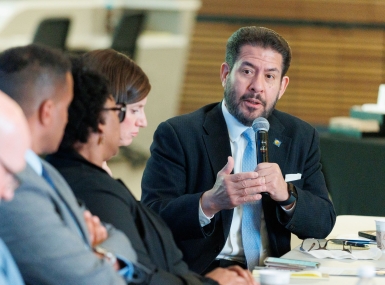Intergovernmental Roles and Responsibilities in Disaster Resilience

Upcoming Events
Related News
County governments across America play a critical role in preparing for or recovering from major disaster events. Since 1980, the United States has experienced 363 weather or climate related disaster events that have cost under $2.6 trillion dollars and taken the lives of 15,971 people. With the increasing frequency and severity of these major disasters, counties, states and the federal government need to coordinate efficiently and effectively to serve our communities. NACo with the support of The Pew Charitable Trust has hosted two intergovernmental roundtable discussions with federal, state and county officials. The first roundtable identified priority challenges in achieving disaster resilience, while the second roundtable focused on defining and building local capacity for disaster resilient communities. The key findings of the intergovernmental roundtable discussions are provided below.
2023 Intergovernmental Roundtable
In February 2023, federal, state and county officials convened for a second roundtable event to outline a roadmap for how to define, improve and sustain local capacity for disaster resiliency and the roles intergovernmental partners can play in building resilient communities. This report features a summary of key findings, with disparities in local capacity found to be a top challenge in achieving disaster resilience. Participants agreed that to improve local capacity it must be defined and measured, identifying six key elements and developing solutions for intergovernmental partnerships to use in building and sustaining capacity. These elements are:
- Funding: For mitigation planning and project implementation
- Staffing: Dedicated personnel, and in some instances, dedicated resilience agencies
- Authority: To enact policy and practice that support mitigation efforts
- Partnerships: To maximize shared expertise, responsibility and resources
- Data & Data Analytics: To monitor and assess indicators of resilience for decision making
- Education: To ensure a reasonable perception of risk, among policymakers and residents
A webinar elaborating on the findings of this report took place on Wednesday, September 20, 2023. More information and the recording of that webinar are available here.
2022 Intergovernmental Roundtable
In February 2022, federal, state and county officials convened for a roundtable discussion to discuss roles and responsibilities across levels of government and the private sector for disaster resiliency efforts and identified top challenges in intergovernmental coordination and collaboration. This brief features a summary of takeaways and priority challenges in achieving disaster resilient communities across the country. Key takeaways include:
- Disaster response is led by local governments and the disasters they face are increasing in frequency and severity.
- Counties, especially small ones, may lack the capacity to take on an increasing demand for emergency management and recovery services.
- Disasters are variable and expensive, and spending is spread across multiple levels of government and private sector; this makes them both difficult to forecast and to afford.
- Federal disaster support is fragmented and in need of interagency coordination.
- The federal award and reimbursement processes are not designed for equitable allocation of resources, are complex and time-intensive to apply and sometimes awarded 3-4 years after a disaster event (requiring many localities to pursue private loans that incur interest).
- Emergency management practices that focus on mitigation produce a greater return than those focused on recovery, but uptake of mitigation-oriented practices is slow.
- Community engagement and education is important for increasing disaster preparedness.
- State and local leaders need reliable and actionable data for decision-making.
Webinar
Defining and Building Capacity for Disaster Mitigation
SEP. 20, 2023
This National Preparedness Month, please join us for an engaging discussion of the key elements of capacity for disaster resilience.

Resource
Emergency Management in County Government: A National Survey

Featured Initiative
Resilient Counties
NACo works to strengthen county resiliency by building leadership capacity to identify and manage risk, and allow counties to become more flexible and responsive.

Contact







